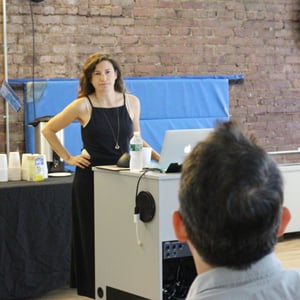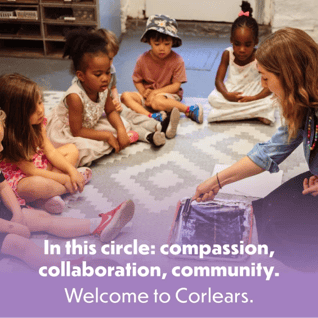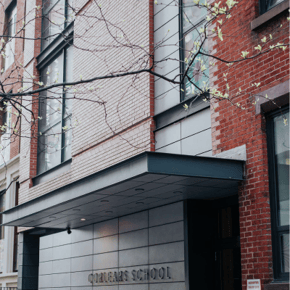Throughout her talk, Amanda shared stories about her experience having an undiagnosed panic disorder as a child, as well as her journey to better understanding her anxiety as an adult. She then opened the floor for parents to ask their own questions, and offered advice on how parents can partner with their children to face their anxieties head-on.

Amanda also spoke to Corlears and the class of 2019 during graduation last year.
Below, Amanda shares part of inspiring story and experience at Corlears.
Some people believe that no one person can make a difference in the world, but I am not one of those people. I know for a fact that a single human being has the power to make the world better or worse; it’s something I learned at Corlears, where I went to school until the third grade.
When I started Corlears, I was two years old and filled with dread. I was scared something would happen to my mother if I left her alone, and I was afraid that something would happen to me if she weren’t nearby to help. When I didn’t know what was going to happen, the world seemed frightening, which meant that new things felt dangerous to me. Even though I went to the same school every day, every day was brand new, which meant I was always waking up afraid.
My teachers let my mom stay in the classroom until I was comfortable enough to let her go. They tried everything they could to ease me into the first few days of each new year. But, given the opportunity, I would have gladly been sewn to the inside of my mom’s pocket. I was embarrassed that I always needed her nearby, especially as I got older and older, but I had no control over it. The feelings were too big for me to fight back against.
The thing is, I loved school, and I hated that my distress interfered with my daily life. Everything we learned was interesting to me, and I always felt like I was part of some magical community. I loved how seriously my teachers took me; that they accepted me for who and how I was without trying to change me. It was just the shock of leaving a familiar place like my own home and entering a different place that was hard for me. Even if I adored that different place.
My best friend was a girl named Melissa, and she didn’t mind leaving her mom like I did. She was excited to be at school and to start each day knowing it would be entirely different from the day before. Melissa lived on my block, and we had a lot in common. Like me, she was obsessed with projects. We’d write plays and perform them. We always had at least five different Broadway productions going at one time. But, unlike me, Melissa was fearless, and that’s why I was taken aback the morning I saw her standing outside of school alone. I wondered if the worst of me had rubbed off on her, and she was now too afraid to go inside. I worried that she was turning around to race back home. But that wasn’t the case. Melissa was standing outside because she was waiting for me.
She had a present for me in her cubby. I grabbed her hand, and we raced inside, and it wasn’t until after she gave me whatever it was that I realized I’d left my mom behind. To my relief, she was waiting right outside the classroom, and I hugged her and let her go. The next day Melissa was there again. This time she had something very urgent to tell me, and she hurried me inside. The next day she needed to show me a new necklace and on it went. I’m not sure how long this lasted, but soon enough, it eased me into school without my mom.
Melissa had turned herself into a bridge for me; she was helping me walk from one life into another, from my mom to school, from old and safe to new and nerve-wracking, but it took me years to understand.
“One night, when I was an adult, it struck me: I could continue to be ruled by my fears and always stick with what was familiar—making my life smaller—or, I could do the hard thing, and face my distress in order to have a big, expansive life. I could make a choice. ”
She was, consciously or not, helping me to disconnect from the safety of my mother so that I had the freedom to plant seeds in a world in which I was on my own. My best friend was helping me to grow up. She was using her thoughtfulness as an action, a skill we’d both learned at Corlears. She was helping me to be less afraid.
When we hurt someone’s feelings, our teacher had us play the board game SORRY with them. When we did something wrong, we played TROUBLE. We were learning how to face what we’d done; how to be accountable. We were also learning the value of friendship. I worried that being without my mom meant she might disappear, but what we’d been learning at school, and what Melissa was showing me, was that being without my mom was an opportunity for me to become part of something larger than myself, to be a member of a community. Melissa showed me what it means to be a friend.
When I left Corlears for my new school, I still made my mother sit in the classroom until I was comfortable, but something new lived inside me, a world view that had grown in me at Corlears, and it was that no matter what a friend is struggling with, we have the power to be their bridge. We can be someone else’s community when they need one.
“When I left Corlears for my new school, I still made my mother sit in the classroom until I was comfortable, but something new lived inside me, a world view that had grown in me at Corlears, and it was that no matter what a friend is struggling with, we have the power to be their bridge. We can be someone else’s community when they need one. ”
It wasn’t until I was grown that I finally understood what Melissa was doing, and to realize she wasn’t only a bridge, making the landing softer while walking with me away from my mom and toward school, but she was also a window, looking outside herself to truly see me, and help me face my fear. I could not have known when I was young that my anxiety would not go away, that it would, in fact, grow much worse. That I would one day find myself avoiding even the things I once found fun. One night, when I was an adult, it struck me: I could continue to be ruled by my fears and always stick with what was familiar—making my life smaller—or, I could do the hard thing, and face my distress in order to have a big, expansive life. I could make a choice.
Corlears taught us the importance of empathy and thoughtfulness and Melissa embodied it by showing me, through her actions, that I was bigger than my fears, and that I had the strength to walk toward uncertainty. And so, as a young adult, I made a choice to face every single thing that scared me—to be my own window and stare straight at the hard things, to become my own bridge, and to walk toward life, like Melissa had taught me when we were kids. Once I could cross from safe to scary on my own, I was able to be a bridge for others, the way Melissa had been for me.
I’m telling you this story because we are all windows and bridges. All we need to do is pay attention to see who’s struggling, to watch for who needs help. Change is hard. Going to a new school, making new friends, saying goodbye, having more responsibility, leaving, it’s all difficult, and it feels scary. But if you can learn how to help someone else, if you can be a real and good friend to someone, you’ll learn lifelong skills that will make you feel at home wherever you go.
“And it’s because of her, and what we learned at Corlears, that I have spent my life facing every fear I have, including this one, talking in front of an audience to a room filled with strangers. ”
Melissa never judged me. She never made me feel ashamed or embarrassed about being so fearful. She accepted me for who I was, because that’s what we had been taught, and everything we were shown made me feel seen and known. I had a home with my mother, but I didn’t feel at home in the world until Corlears gave us the tools, and Melissa showed me how.
It takes work and concentration to see someone else, and it takes practice to be a good friend. You’ll make mistakes, you’ll mess up, and that’s okay. You’re allowed. Someone who can’t accept you if you mess up is neither your window nor your bridge.
When you leave one place, you take the best of it with you, and you share it. You pass it on. Melissa taught me things about life that I’ve never forgotten, that I’ve carried with me forever. Her actions showed me that life is less frightening when you walk toward what scares you and harder when you avoid it. She showed me that just because something feels scary, doesn’t mean it’s dangerous. And it’s because of her, and what we learned at Corlears, that I have spent my life facing every fear I have, including this one, talking in front of an audience to a room filled with strangers.
One person has the power to make life better or worse for another. But it’s a choice. And Corlears taught me to make that choice. I am here today to give you this story, to take with you into your new school, and hold it like a good luck charm, knowing that you have the power to be someone else’s window and bridge, and hoping you will understand that if you have the ability to do that for someone else, then you have the power to do it for yourself.



